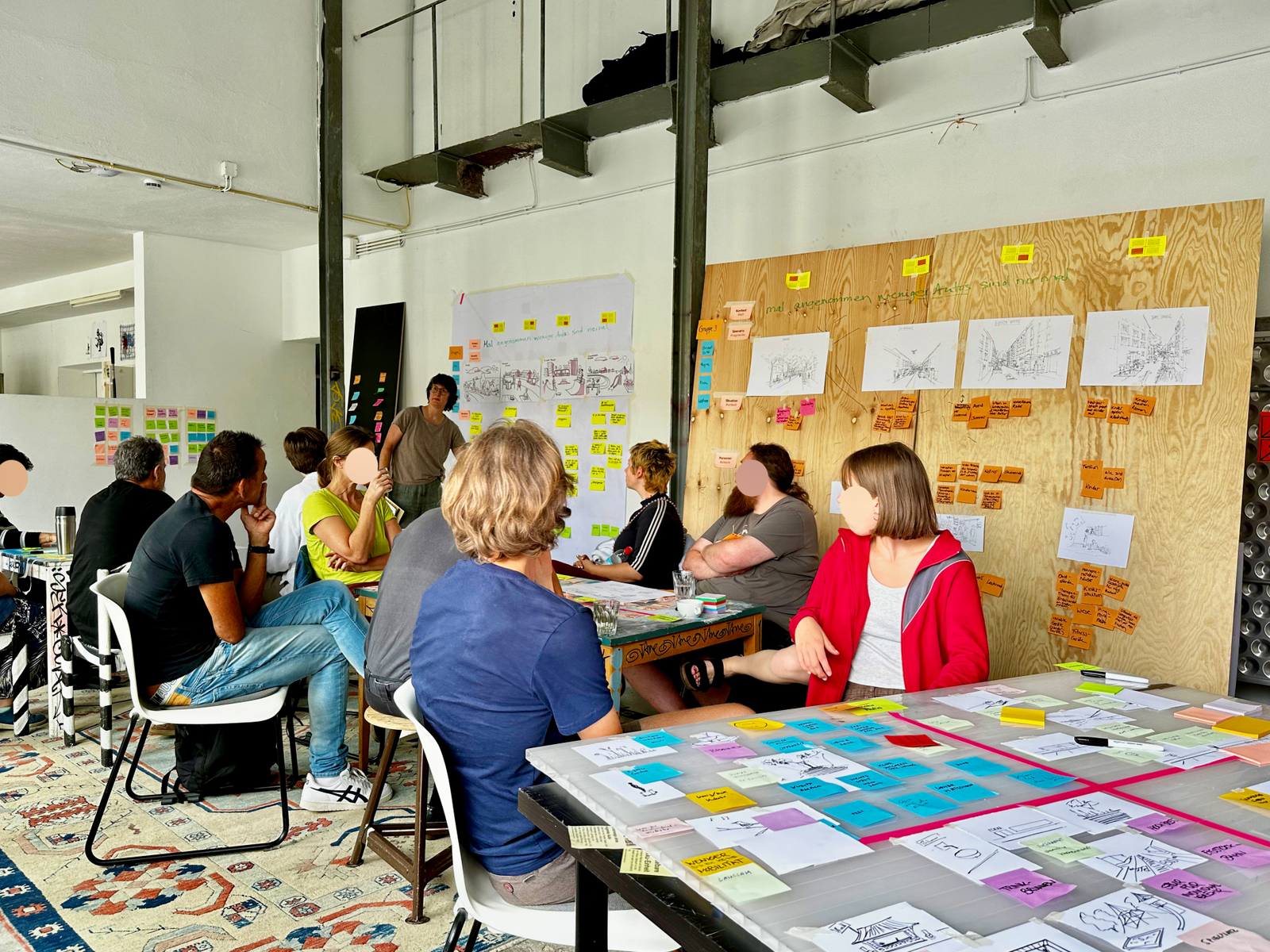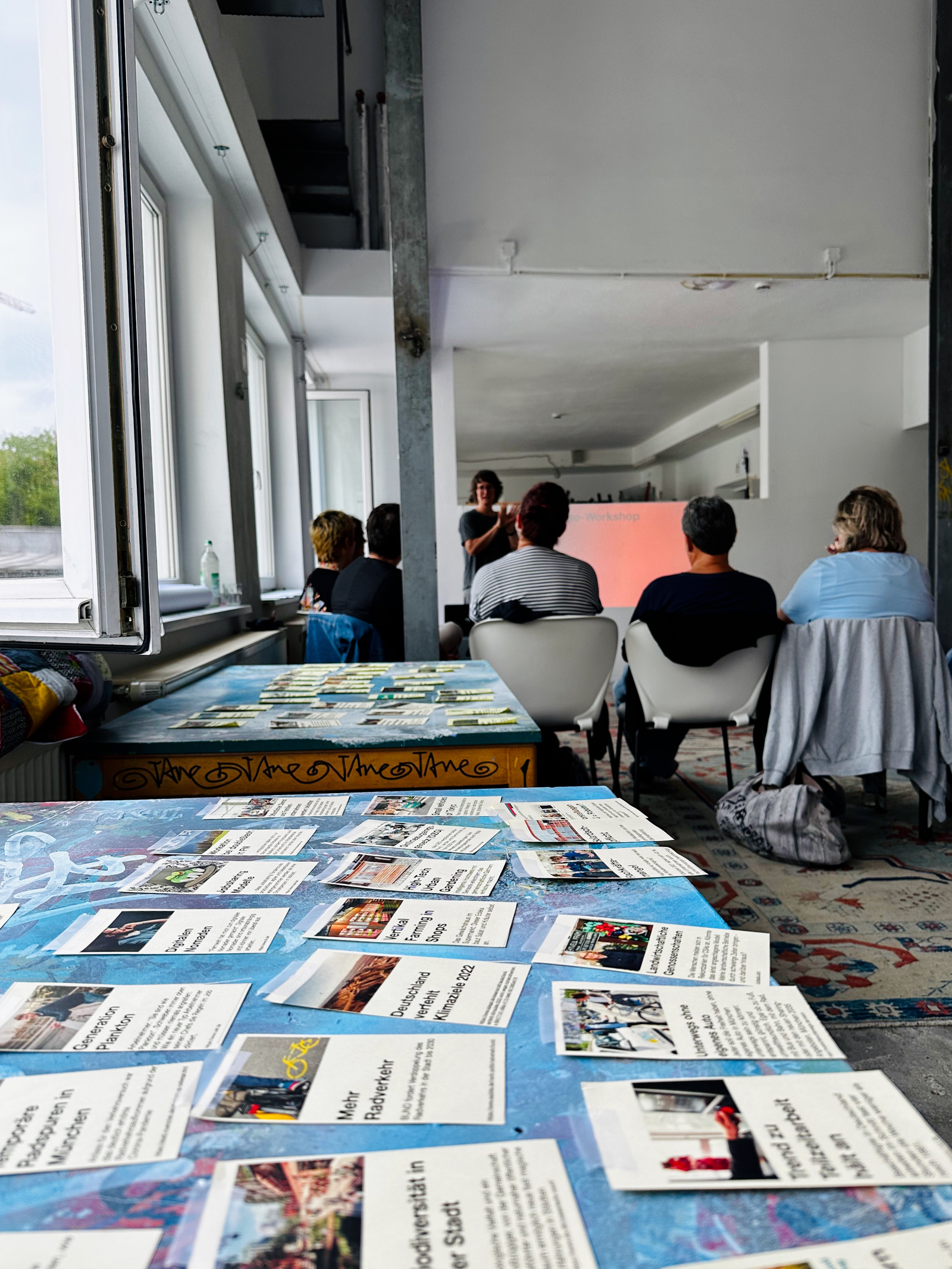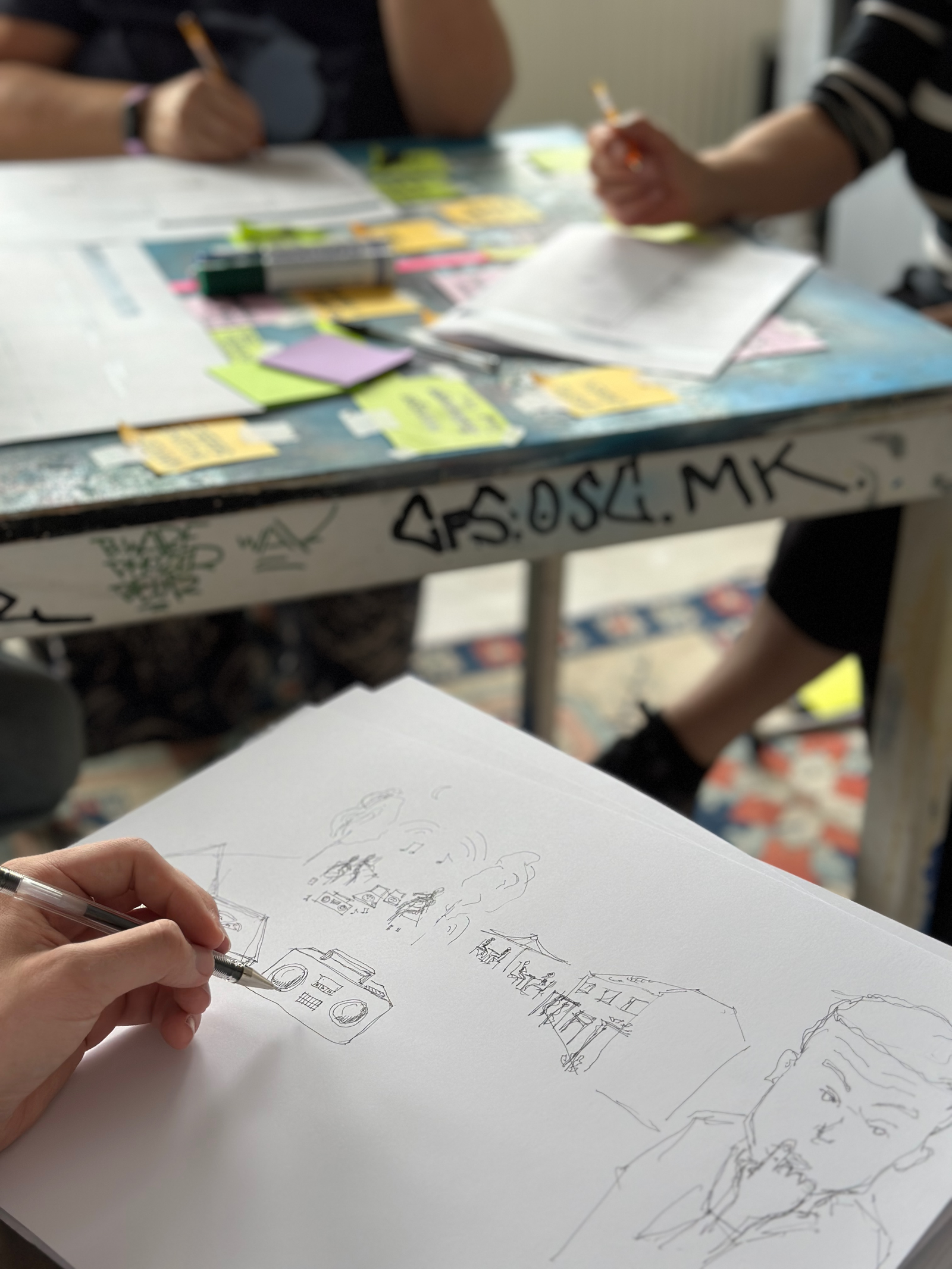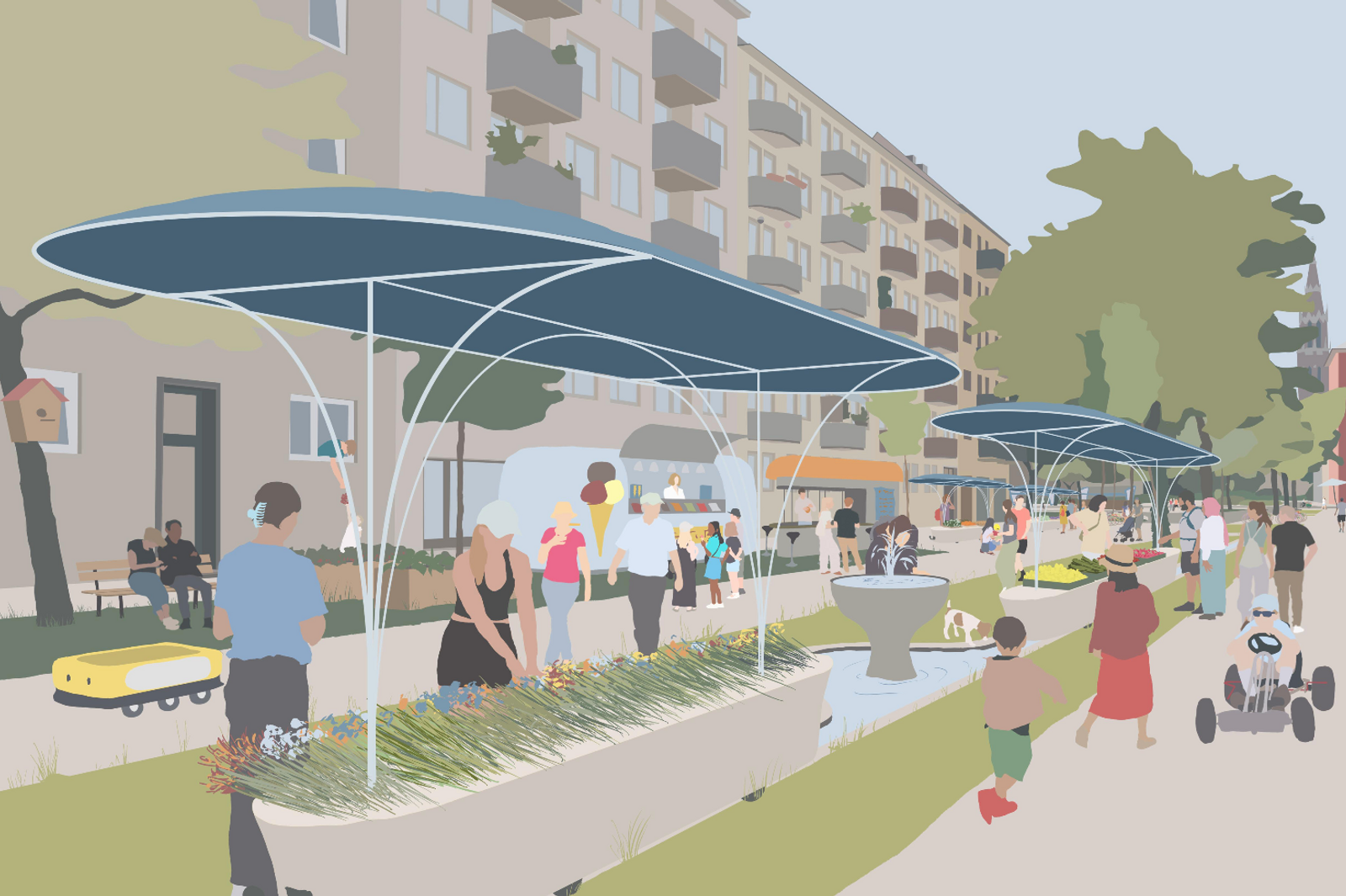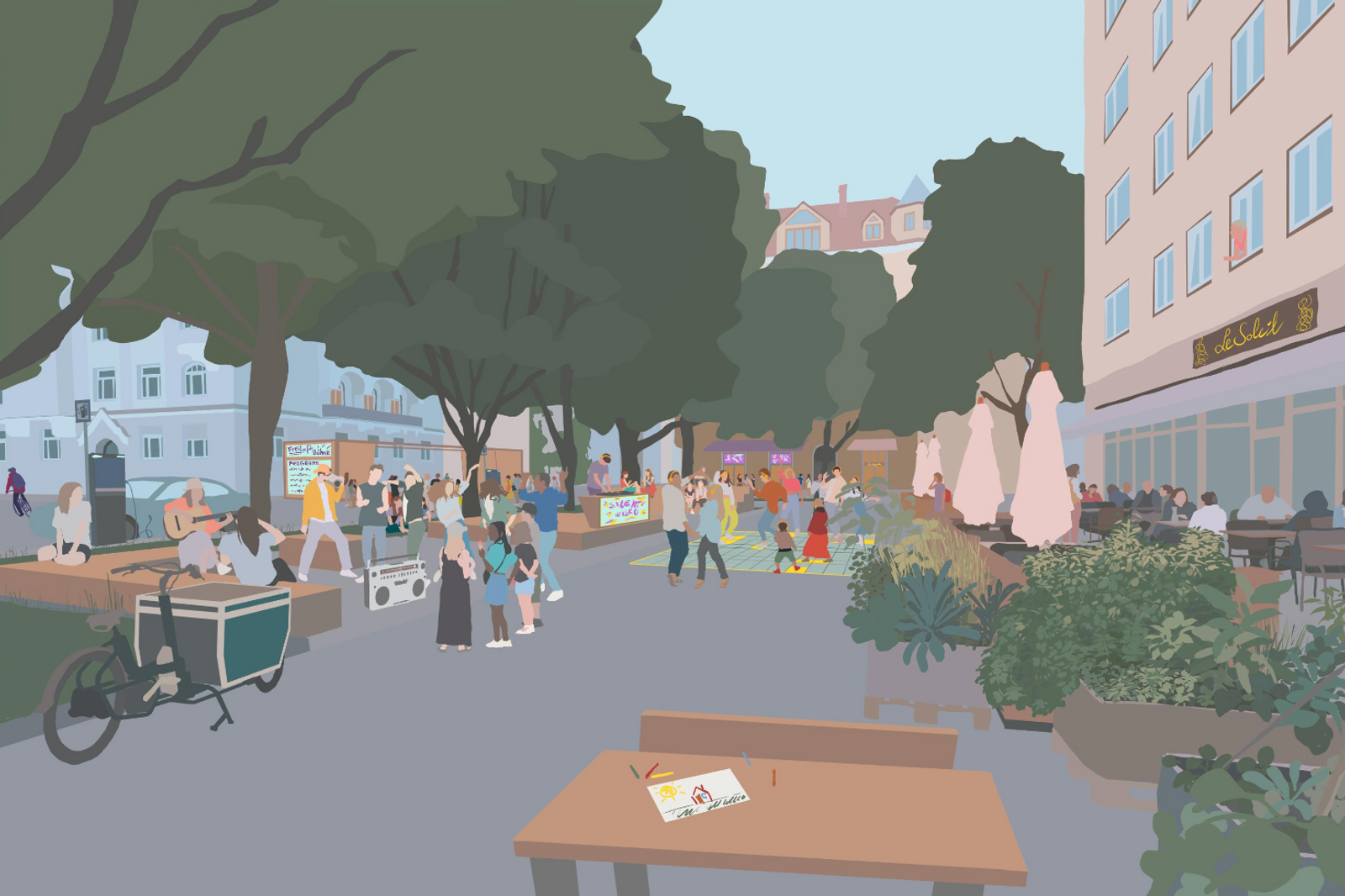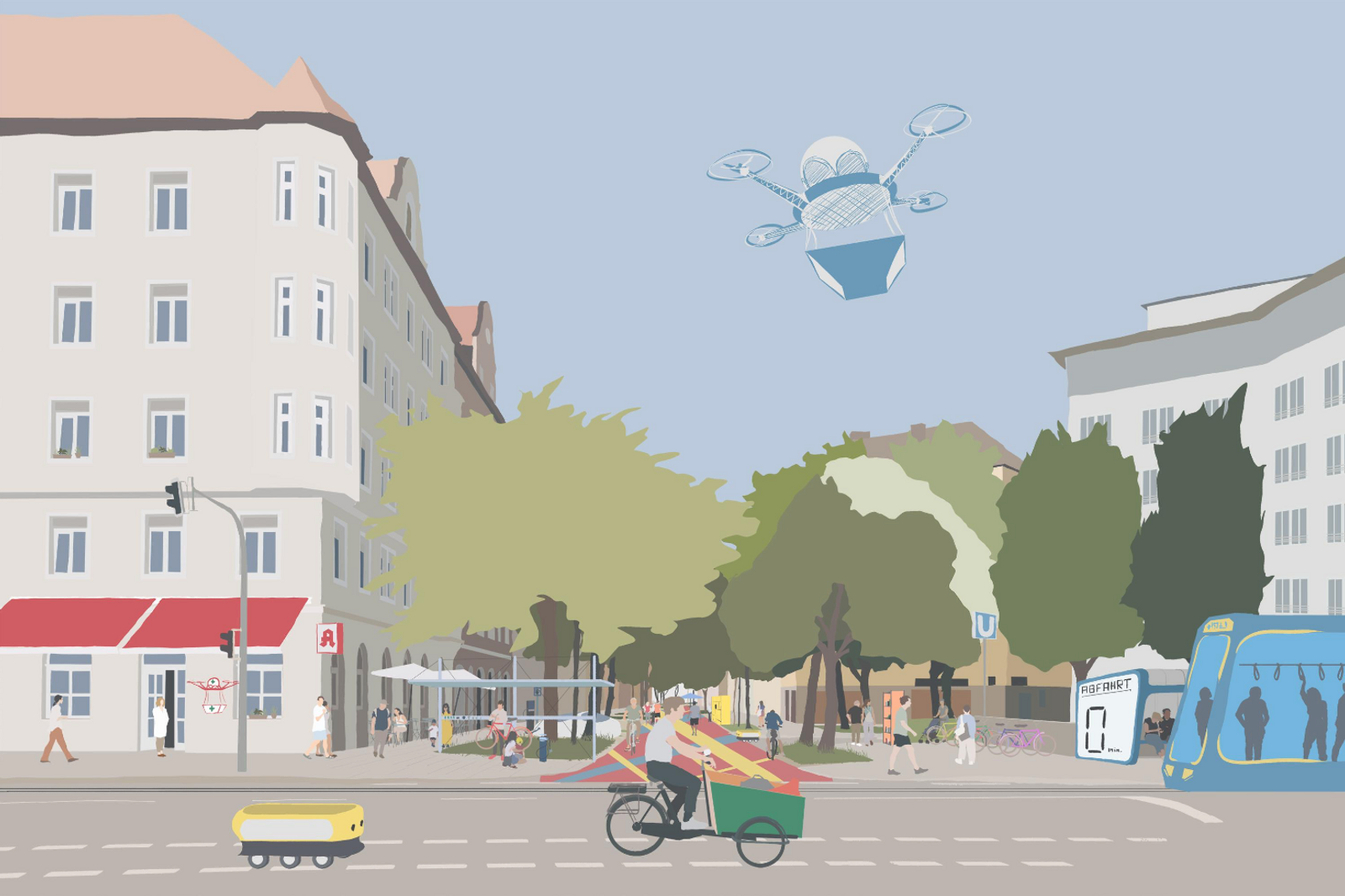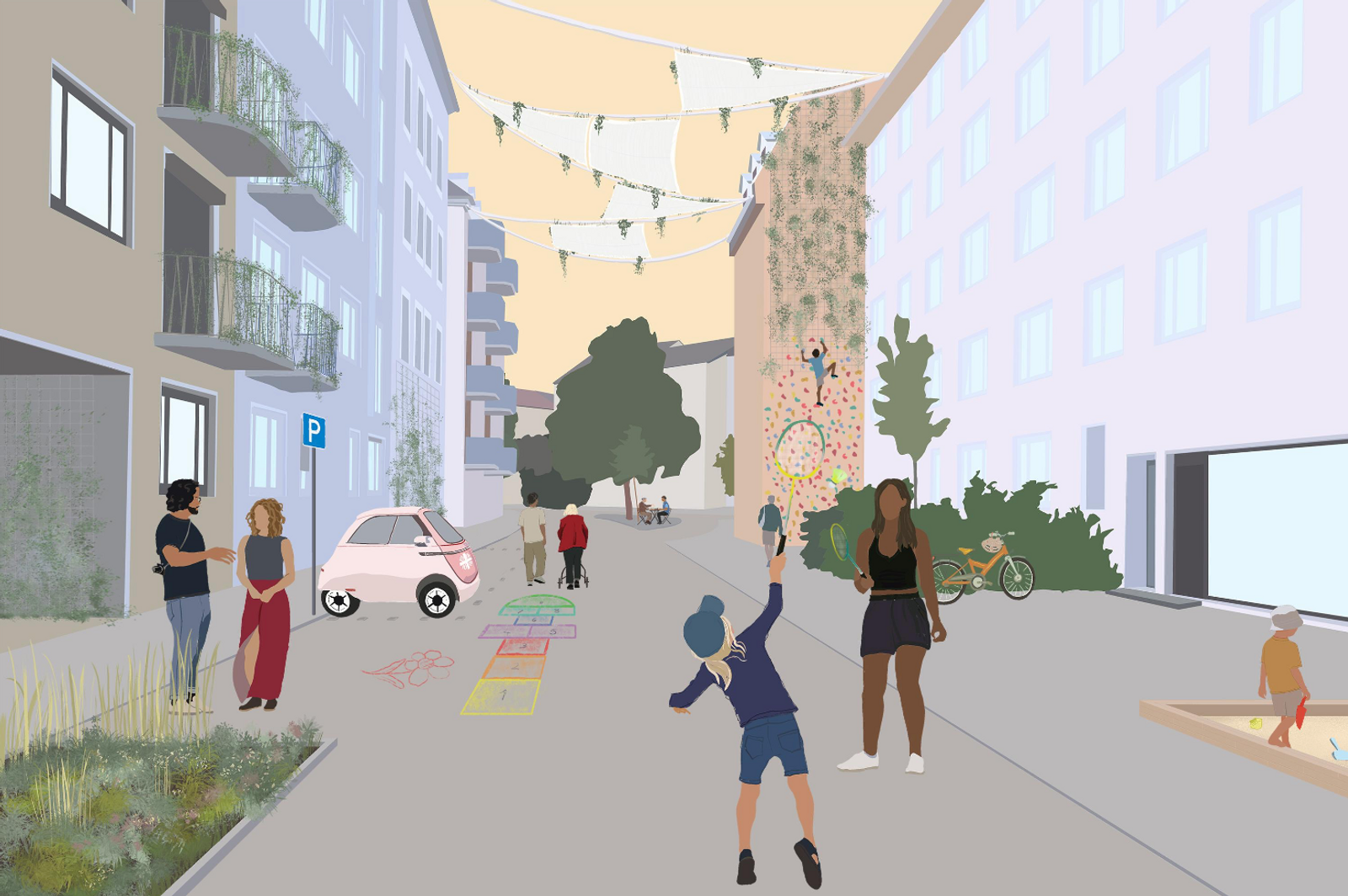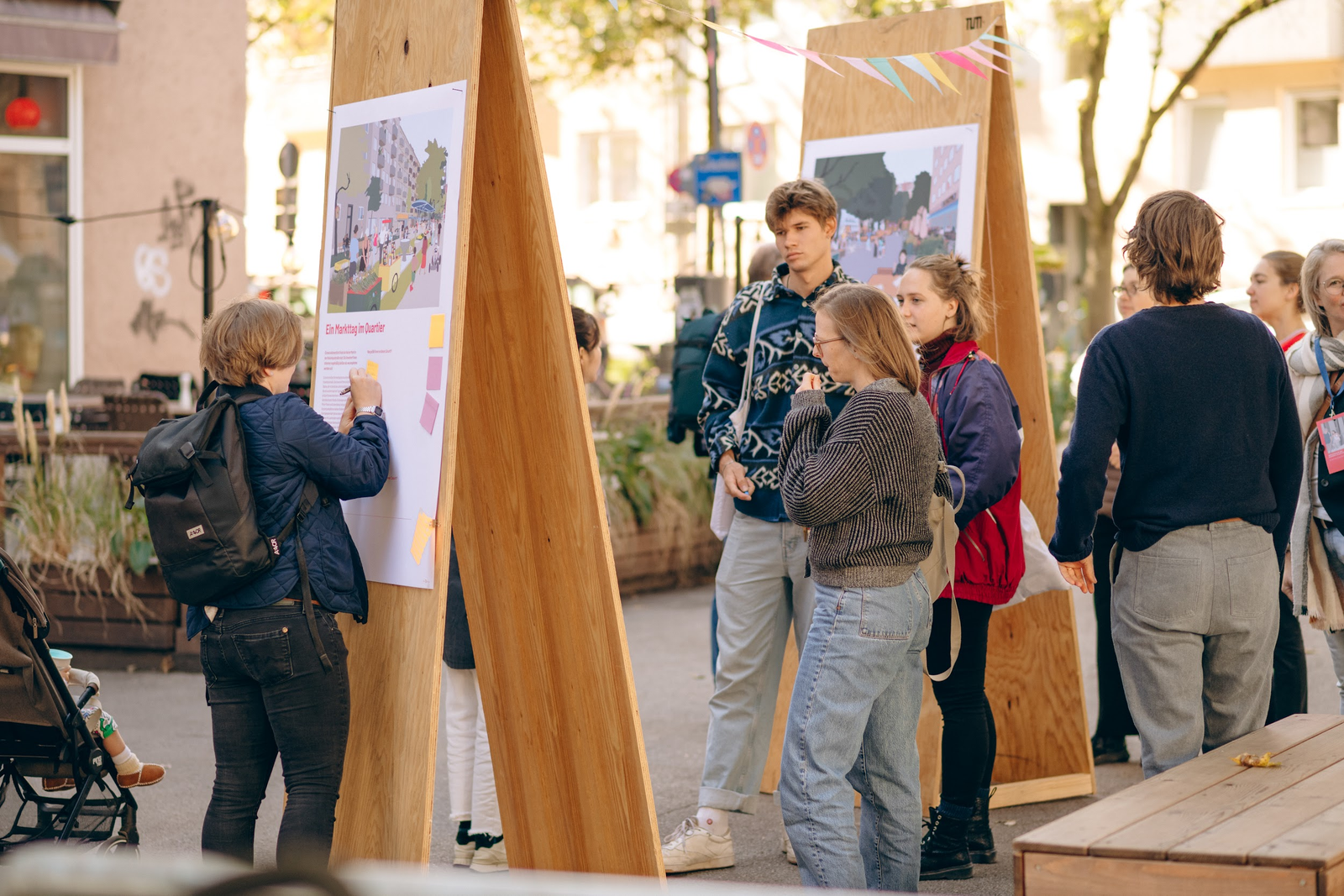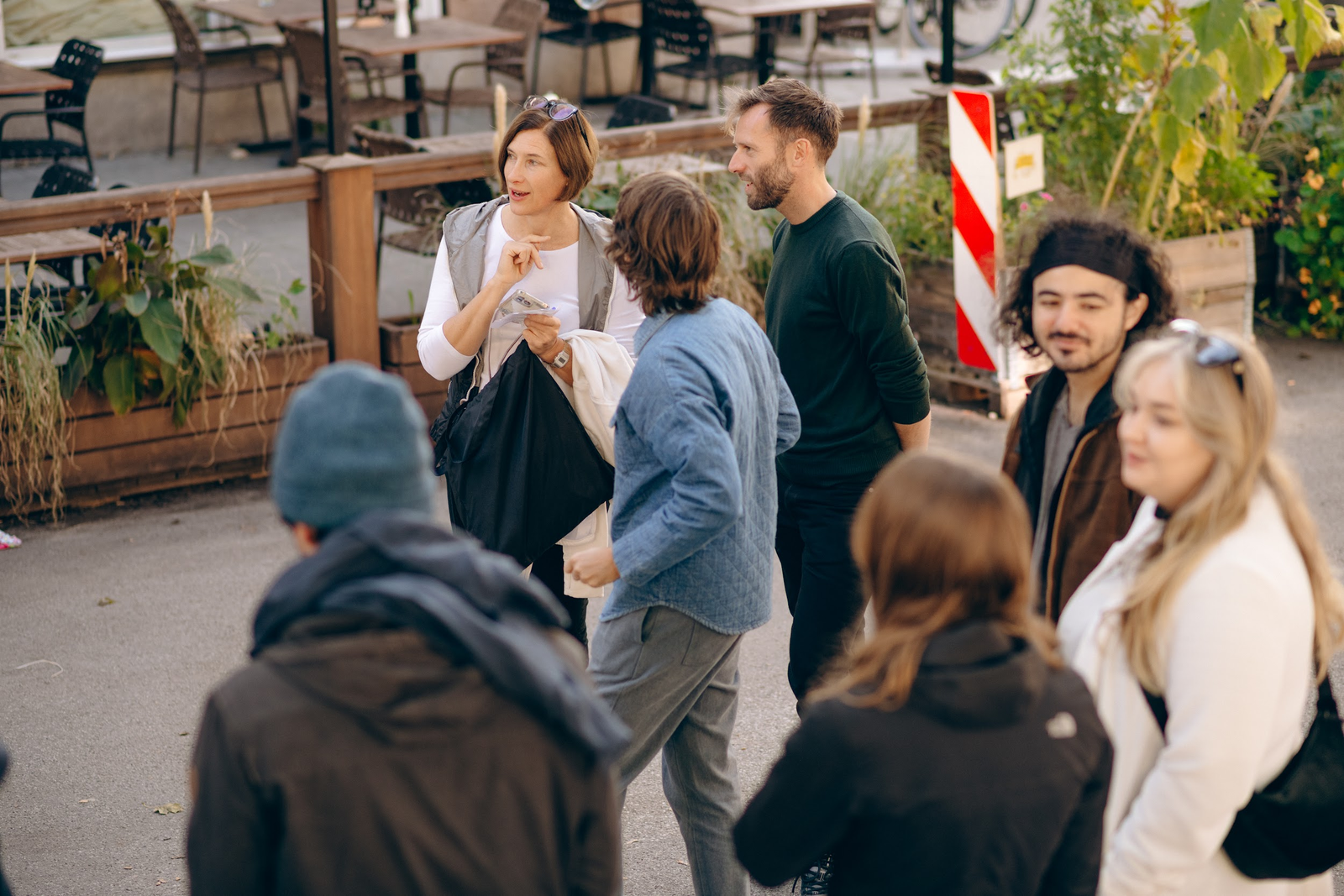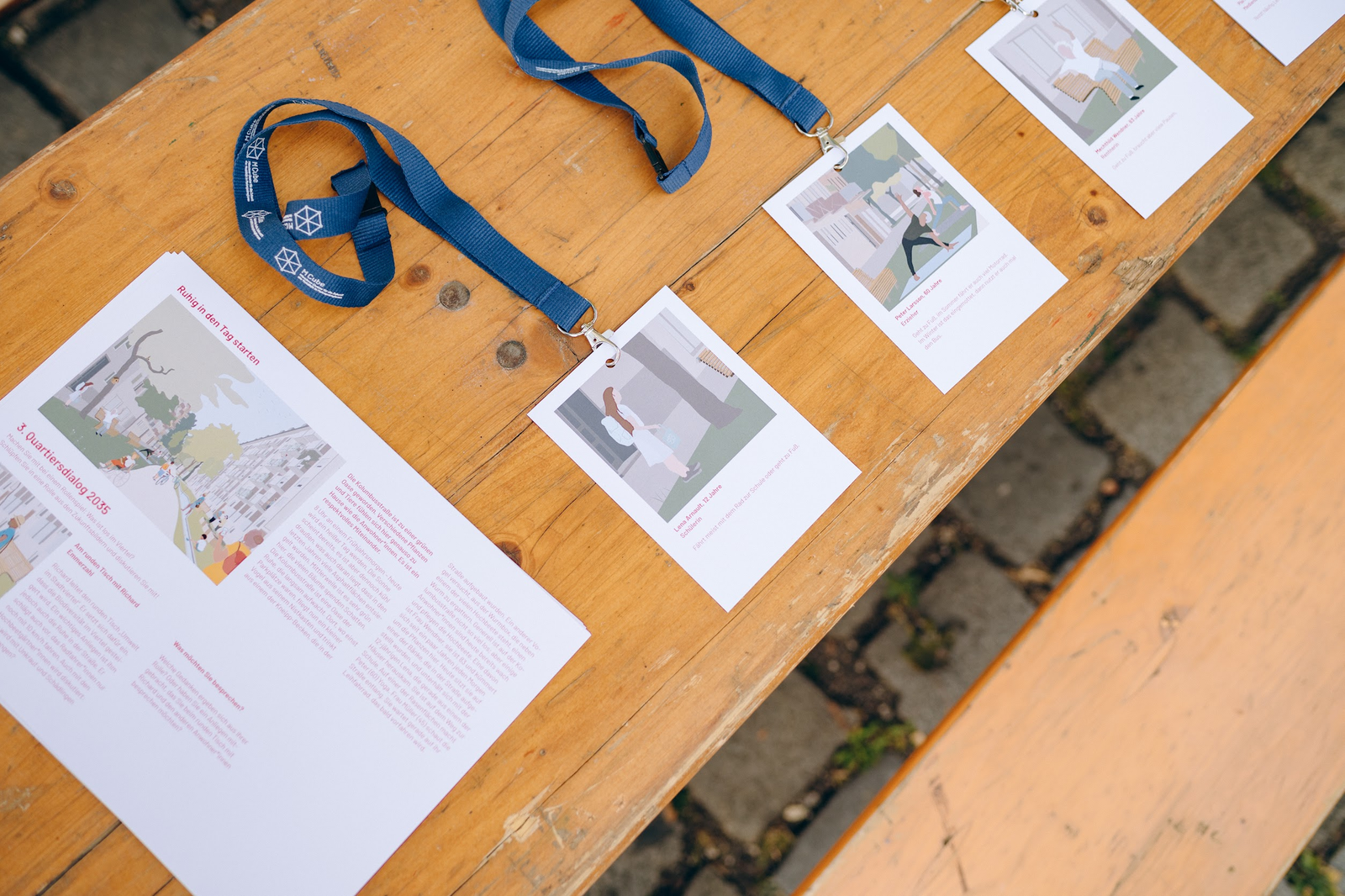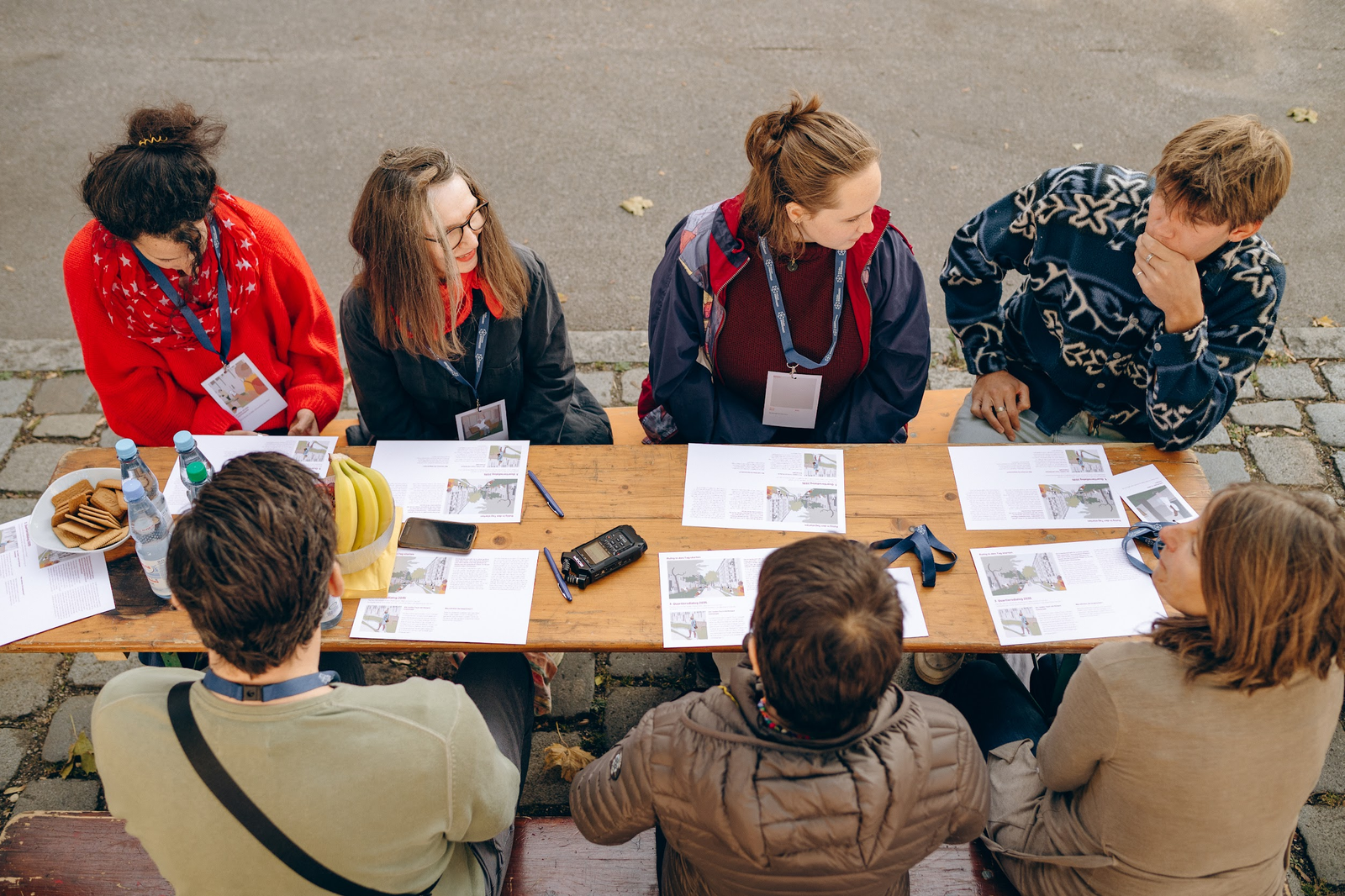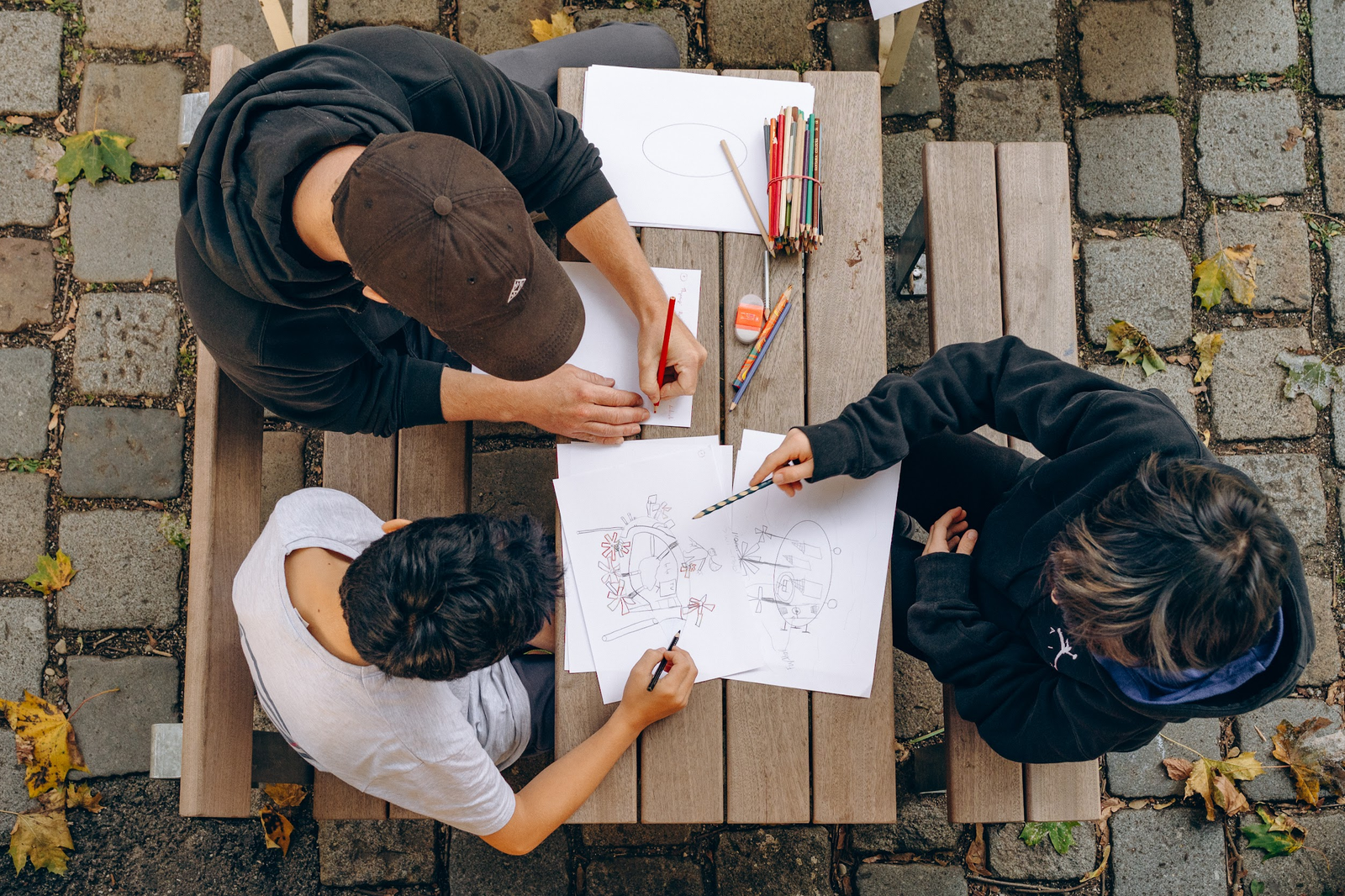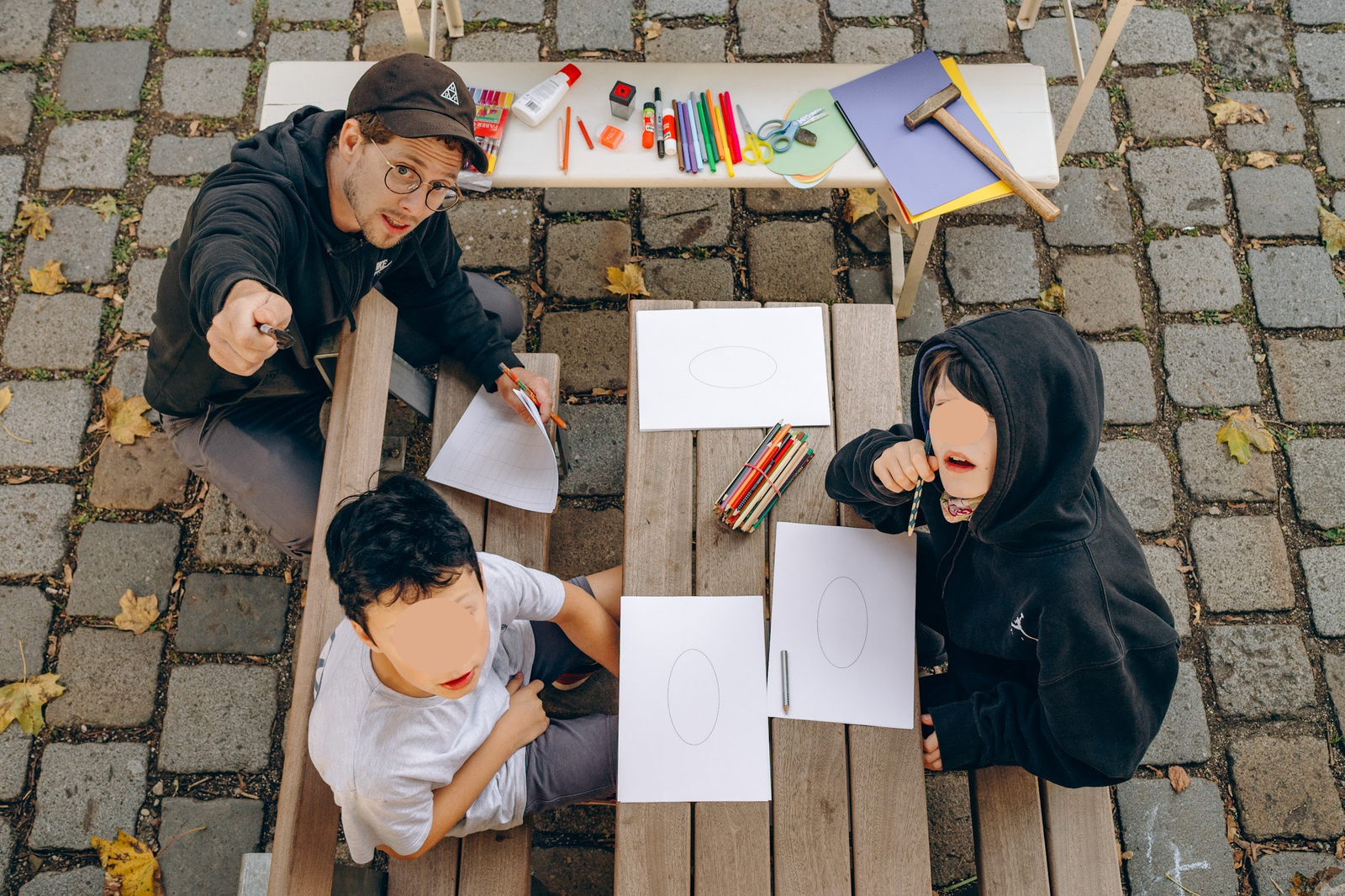aqt — Redesigning urban neighbourhoods
How must we rethink mobility in urban neighbourhoods in order to tackle the climate crisis and uphold social justice? What are possible paths for change? How can we reshape urban communities together?
With their Mobility Strategy 2035 and Urban Development Plan 2040, the City of Munich aims to reduce individual car traffic and improve the quality of urban public spaces. In line with these goals the research project »aqt« explores transition pathways to neighbourhoods characterized by fewer cars and more space for people.
Research approach | Living Labs
From May 2023 to October 2023, various measures will be temporarily implemented and evaluated in two neighbourhoods in Munich: »Südliche Au« and »Walchenseeplatz«. During this time, further participation formats take place in order to develop transformation paths together with research partners, municipal administration, industry and NGOs and civil society. The findings produced during the Living Lab are further developed, evaluated and discussed by summer 2024. The project period ends in October 2024.
There needs to be a reallocation of public space; plenty of room for improvement for a much more efficient use of private cars.”
In the neighboorhood »Südliche Au« on Schlotthauerplatz and Edlingerplatz and Kolumbusstraße, the urban space was redesigned with lawn, raised beds and a sandpit instead of asphalt, bike racks and seating instead of parking spaces. Over 5 months, residents can experience their neighbourhood with various recreation areas as well as new open-pore road surface to keep the city cooler.
The residents play an important role in this project as experts on the local mobility situation and as a source of feedback. Through its participatory and transdisciplinary character, the aqt project creates a platform for the reorganisation, negotiation and transformation of public space in the selected neighbourhoods.
Feedback on everyday needs from citizens is an important input for urban planners and policy makers, so that incentives for behavioural change get it right when it comes to adpoting these ideas and concept to other neighbourhoods.
Futures Workshop
Living labs are a great research tools to test concrete measures in real-life and get in touch with habbits, needs, local culture, and reveiled preferences. Confronting people with an alternative reality produces great learnings about what works and what does not – fast. However, there is a down-side. People get entangeled in the nitty-gritty details of their new everday life. And sometimes this makes it hard to imagine what could be possible if all the problems – that come to life in the early phase of a new situation – were resolved over time.
To spark the imagination and to offer the citizens a space for discourse, 15 residents were invited to join a design futuring process. In a two-half-day workshop the group explored trends and signals that might affect them in their neighbourhood and then jointly developed future scenarios which were illustrated and translated to narratives of neighbourhood-personas that people can relate to.
Futures Forum
These Images of the Futures, in the form of illustrated szenarios and storyboards, served a larger group as an entry point to a value negotiation of preferrable futures during a Futures Forum open to the public in October 2023.
Besides the exhibition, the neighbourhood came together to exchange pros and cons and conflicting perspectives during a role play guided by professional actors of local impro theatres.
The youngest members of the neighboorhood could express their wishes and images of the future at an AI-aided »Kinderwerkstatt«, a format by students of the Faculty of Design of the Hochschule München, which explores how children see and draw the city of the future and uses generative AI to translate the childish images into photo-realistic images which are harder to dismiss in the adult political discourse.
What’s next?
The living lab has created a lot of discourse in the neighbourhood, greater Munich and on national media. The learnings are highly valuable for the greater transformation of our cities. Besides scientific publications, the living lab furniture, future scenarios and storyboards will be exhibited in 2024. More information and updates: aqt.
Intervention, articles, workshop, broadcasts and talk
-
interventionZukünfte Forum: Autoreduzierte Quartiere für eine lebenswerte Stadt @ MCube - Münchner Cluster für die Zukunft der Mobilität in MetroploregionenCitizen Forum exploring futures of car-reduced neighbourhoods for a liveable city @ MCube - Münchner Cluster für die Zukunft der Mobilität in Metroploregionen, Südliche Au, Munich (DE)2023-10
-
articleBefürworter und Gegner brüllen sich nur noch an @ Süddeutsche ZeitungProject aqt mentioned on Süddeutsche Zeitung2023-08
-
article„Jetzt herrscht Krieg, Leute brüllen sich nur noch an“: Pilotprojekt spaltet Anwohner in München @ MerkurProject aqt mentioned on Merkur2023-08
-
articleCSU fordert Abstimmung über Parkplatz-Klau @ BILDProject aqt mentioned on BILD2023-08
-
workshopZukünfte-Workshop: Autoreduzierte Quartiere für eine lebenswerte Stadt @ MCube - Münchner Cluster für die Zukunft der Mobilität in MetroploregionenFutures Workshop exploring car-reduced neighbourhoods for a liveable city with citizens @ MCube - Münchner Cluster für die Zukunft der Mobilität in Metroploregionen, Südliche Au, Munich (DE)2023-07
-
broadcastWie eine autofreie Straße ein Viertel spaltet @ ZDFheuteProject aqt mentioned on ZDFheute2023-07
-
articleWie eine kleine Straße ein Viertel spaltet @ Süddeutsche ZeitungProject aqt mentioned on Süddeutsche Zeitung2023-07
-
article»Nur ideologisch Parkplätze zu streichen, hilft niemandem« @ Süddeutsche ZeitungProject aqt mentioned on Süddeutsche Zeitung2023-07
-
broadcastZoff um Spielstraße @ Abendschau - Der Süden, BR FernsehenProject aqt mentioned on BR Fernsehen, Bayrischer Rundfunk2023-07
-
article„Das Autofahren unbequem machen“ – Münchner Pilotprojekt setzt auf Park statt Parkplätze @ tzProject aqt mentioned on tz2023-06
-
broadcastAus Grau wird Grün - Kolumbusstraße soll zur Kolumbuswiese werden @ münchen.tvProject aqt mentioned on münchen.tv2023-06
-
articleAZ-Besuch in der Kolumbusstraße: So kommt die autofreie Straße wirklich an @ azProject aqt mentioned on Abendzeitung München2023-06
-
articleReallabor startet: ein Sommer in der Au @ Blog Hans Sauer StiftungProject aqt mentioned on Blog, Hans Sauer Stiftung2023-06
-
talkDesign Futuring: Zukunftsszenarien strategisch erkunden, entwerfen und verhandeln.Talk @ Urban Design Coffee Talk, Associate Professorship for Urban Design, TUM School of Engineering and Design, Munich, DE2023-05
-
articleGärtnern, wo sonst Autos stehen @ Süddeutsche ZeitungProject aqt mentioned on Süddeutsche Zeitung2023-05
-
articleSommer in der Stadt – Ab jetzt in der südlichen Au! @ Blog M CubeProject aqt mentioned on Blog, M Cube2023-05
-
interventionZukünfte Forum: Autoreduzierte Quartiere für eine lebenswerte Stadt @ MCube - Münchner Cluster für die Zukunft der Mobilität in MetroploregionenCitizen Forum exploring futures of car-reduced neighbourhoods for a liveable city @ MCube - Münchner Cluster für die Zukunft der Mobilität in Metroploregionen, Südliche Au, Munich (DE)2023-10
-
article„Jetzt herrscht Krieg, Leute brüllen sich nur noch an“: Pilotprojekt spaltet Anwohner in München @ MerkurProject aqt mentioned on Merkur2023-08
-
workshopZukünfte-Workshop: Autoreduzierte Quartiere für eine lebenswerte Stadt @ MCube - Münchner Cluster für die Zukunft der Mobilität in MetroploregionenFutures Workshop exploring car-reduced neighbourhoods for a liveable city with citizens @ MCube - Münchner Cluster für die Zukunft der Mobilität in Metroploregionen, Südliche Au, Munich (DE)2023-07
-
articleWie eine kleine Straße ein Viertel spaltet @ Süddeutsche ZeitungProject aqt mentioned on Süddeutsche Zeitung2023-07
-
broadcastZoff um Spielstraße @ Abendschau - Der Süden, BR FernsehenProject aqt mentioned on BR Fernsehen, Bayrischer Rundfunk2023-07
-
broadcastAus Grau wird Grün - Kolumbusstraße soll zur Kolumbuswiese werden @ münchen.tvProject aqt mentioned on münchen.tv2023-06
-
articleReallabor startet: ein Sommer in der Au @ Blog Hans Sauer StiftungProject aqt mentioned on Blog, Hans Sauer Stiftung2023-06
-
articleGärtnern, wo sonst Autos stehen @ Süddeutsche ZeitungProject aqt mentioned on Süddeutsche Zeitung2023-05
-
articleBefürworter und Gegner brüllen sich nur noch an @ Süddeutsche ZeitungProject aqt mentioned on Süddeutsche Zeitung2023-08
-
articleCSU fordert Abstimmung über Parkplatz-Klau @ BILDProject aqt mentioned on BILD2023-08
-
broadcastWie eine autofreie Straße ein Viertel spaltet @ ZDFheuteProject aqt mentioned on ZDFheute2023-07
-
article»Nur ideologisch Parkplätze zu streichen, hilft niemandem« @ Süddeutsche ZeitungProject aqt mentioned on Süddeutsche Zeitung2023-07
-
article„Das Autofahren unbequem machen“ – Münchner Pilotprojekt setzt auf Park statt Parkplätze @ tzProject aqt mentioned on tz2023-06
-
articleAZ-Besuch in der Kolumbusstraße: So kommt die autofreie Straße wirklich an @ azProject aqt mentioned on Abendzeitung München2023-06
-
talkDesign Futuring: Zukunftsszenarien strategisch erkunden, entwerfen und verhandeln.Talk @ Urban Design Coffee Talk, Associate Professorship for Urban Design, TUM School of Engineering and Design, Munich, DE2023-05
-
articleSommer in der Stadt – Ab jetzt in der südlichen Au! @ Blog M CubeProject aqt mentioned on Blog, M Cube2023-05
-
interventionZukünfte Forum: Autoreduzierte Quartiere für eine lebenswerte Stadt @ MCube - Münchner Cluster für die Zukunft der Mobilität in MetroploregionenCitizen Forum exploring futures of car-reduced neighbourhoods for a liveable city @ MCube - Münchner Cluster für die Zukunft der Mobilität in Metroploregionen, Südliche Au, Munich (DE)2023-10
-
articleCSU fordert Abstimmung über Parkplatz-Klau @ BILDProject aqt mentioned on BILD2023-08
-
articleWie eine kleine Straße ein Viertel spaltet @ Süddeutsche ZeitungProject aqt mentioned on Süddeutsche Zeitung2023-07
-
article„Das Autofahren unbequem machen“ – Münchner Pilotprojekt setzt auf Park statt Parkplätze @ tzProject aqt mentioned on tz2023-06
-
articleReallabor startet: ein Sommer in der Au @ Blog Hans Sauer StiftungProject aqt mentioned on Blog, Hans Sauer Stiftung2023-06
-
articleSommer in der Stadt – Ab jetzt in der südlichen Au! @ Blog M CubeProject aqt mentioned on Blog, M Cube2023-05
-
articleBefürworter und Gegner brüllen sich nur noch an @ Süddeutsche ZeitungProject aqt mentioned on Süddeutsche Zeitung2023-08
-
workshopZukünfte-Workshop: Autoreduzierte Quartiere für eine lebenswerte Stadt @ MCube - Münchner Cluster für die Zukunft der Mobilität in MetroploregionenFutures Workshop exploring car-reduced neighbourhoods for a liveable city with citizens @ MCube - Münchner Cluster für die Zukunft der Mobilität in Metroploregionen, Südliche Au, Munich (DE)2023-07
-
article»Nur ideologisch Parkplätze zu streichen, hilft niemandem« @ Süddeutsche ZeitungProject aqt mentioned on Süddeutsche Zeitung2023-07
-
broadcastAus Grau wird Grün - Kolumbusstraße soll zur Kolumbuswiese werden @ münchen.tvProject aqt mentioned on münchen.tv2023-06
-
talkDesign Futuring: Zukunftsszenarien strategisch erkunden, entwerfen und verhandeln.Talk @ Urban Design Coffee Talk, Associate Professorship for Urban Design, TUM School of Engineering and Design, Munich, DE2023-05
-
article„Jetzt herrscht Krieg, Leute brüllen sich nur noch an“: Pilotprojekt spaltet Anwohner in München @ MerkurProject aqt mentioned on Merkur2023-08
-
broadcastWie eine autofreie Straße ein Viertel spaltet @ ZDFheuteProject aqt mentioned on ZDFheute2023-07
-
broadcastZoff um Spielstraße @ Abendschau - Der Süden, BR FernsehenProject aqt mentioned on BR Fernsehen, Bayrischer Rundfunk2023-07
-
articleAZ-Besuch in der Kolumbusstraße: So kommt die autofreie Straße wirklich an @ azProject aqt mentioned on Abendzeitung München2023-06
-
articleGärtnern, wo sonst Autos stehen @ Süddeutsche ZeitungProject aqt mentioned on Süddeutsche Zeitung2023-05







